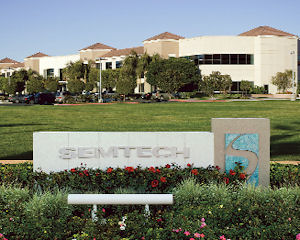Semiconductor developer Semtech Corp. is buying a Canadian company in a nearly $500 million deal that ushers the Camarillo-based public company into new markets. Semtech President and CEO Mohan Maheswaran said the purchase of Gennum Corp., a public company listed on the Toronto Stock Exchange, will create instant opportunity for Semtech in the video market and data communication markets, including fiber optic to homes, storage networks and cloud computing. “Those are both areas Semtech does not play in at all,” Maheswaran said. “It is nice to get immediate traction into video and immediate positioning in the data communications (market).” Semtech serves several diverse industries, including enterprise computing, industrial, communications and high end consumer products. The company employs 168 people in the San Fernando Valley region and has a total workforce of more than 900. Semtech will finance the purchase with cash and a portion of $400 million from Jeffries Finance LLC, a global investment bank headquartered in New York City that was an adviser on the deal. For the third quarter, the most recent results available, Semtech reported net income of $27 million, or 40 cents per diluted share, on revenues of $124 million. In its third quarter, Gennum reported net earnings of $3.3 million, or 10 cents per diluted share, on revenues of $36.7 million. The price of Gennum stock doubled the day after the acquisition was announced on Jan. 23, from $6.15 to $13.45 a share. Semtech experienced a higher volume of trading at that same time but no corresponding boost in its stock price. Maheswaran said the acquisition will help Semtech to more quickly reach a 2012 revenue goal of $1 billion. Attempts to reach a representative of Gennum were unsuccessful. In a prepared statement, Gennum President and CEO Franz J. Fink said the combined companies will grow beyond what they could do separately. “After a comprehensive review of Gennum’s strategic options, we are convinced that this is the best avenue to unlock the underlying value for shareholders that has been created by the Gennum team,” Fink said. Gennum’s primary business is in video broadcast and surveillance, consumer and optical communications markets. The company employs about 450 people, about half of them in engineering positions, and has global offices in Japan, India, Germany, Mexico and Taiwan. It is expected that most of the management will stay on once the sale is complete, Maheswaran added. Despite having different core markets, the companies have some major clients in common, including Panasonic, Ericsson and Samung. Semtech, which specializes in analog components, is a stronger analog product company for purchasing another leader in analog technology, said Cody Acree, a Williams Financial Group analyst who covers Semtech. Analog semiconductor components tend to have a longer shelf life than digital ones, Acree said. “It is a predictable and profitable business,” he said. Maheswaran said he was familiar with Gennum before it was placed on the selling block. While an outlier in the semiconductor industry, Gennum had a reputation for being well run and for having good technology. “They are a company that is best in class in signal integrity products,” Maheswaran said. Semtech was among several companies that expressed interest in buying Gennum. While Semtech does not frequently acquire other companies as a means to grow, it has a history of purchasing existing technologies to further diversify its product line and add avenues of growth, Acree said. The company’s last acquisition took place in November 2009 when it purchased Sierra Monolithics, an Irvine-based developer of analog chips for communications systems and applications. The deal was valued at $180 million. Maheswaran said the company’s diversification strategy centers on the concept of balance — both in terms of the products it sells and its geographic sales territory. That strategy mitigates risks as stronger markets keep sales flowing when others are weak, he said. “You don’t typically see all the markets going down at the same time,” Maheswaran said.
